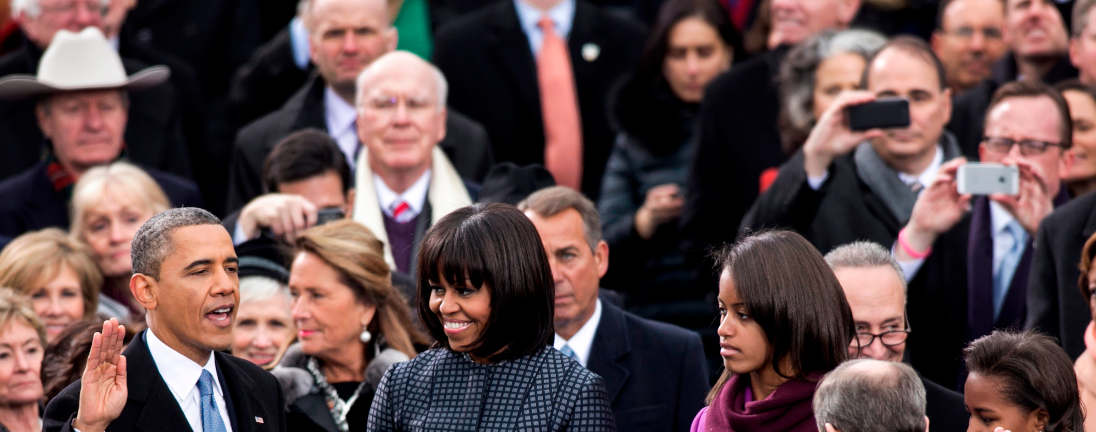
The American Presidency
Presidential elections and presidential power
- Main
menu ►
- Life and
institutions
- Tourism & travel
- Places
About-the-USA.com
A learner's guide to discovering the United States
A learner's guide to discovering the United States
THE PRESIDENCY - POWER AND GLORY
The President of the United States holds Executive power, as head of the United States Government.The powers of the President are laid down in the Second Article of the United States Constitution.

The White House in Washington, the President's official residence
Most recent U.S. presidents have had to live in cohabitation with their political opponents. In 2023, Joe Biden, the Democratic president, has to govern in accord with a U.S..Senate controled by the Republicans, and just as the President can veto legislation proposed by Congress, which has legislative power; so Congress can, if it wants, block presidential policies. This is part of the USA's fundamental system of "checks and balances" designed to prohibit the concentration of power.
Though this might create an unworkable situation in many countries, the United States has traditionally managed to make this system work, on account of the general similarity between the two main political parties. By negotiating with Congress, and reaching certain compromises, American Presidents are usually able to put through most of the legislative measures their government wished to introduce.
Since the election of Donald Trump in 2016 however, differences between the Republicans and the Democrats have been polarized, and the traditional consensus has sometimes been hard to find. In 2023, with Trump supporters controling business in the Senate, things have become seriously complicated.
The official residence, and office, of the President of the United States is the White House in Washington.
ELECTING A PRESIDENT
►
For the 2024 Presidential contest, see The 2024 Election, an
advanced-level English text, with glossary, audio and exercises.
Hôtels
throughout the USA
A great selection at best rates
from Booking.com
:

Los
Angeles:

San Francisco
New York
Washington
Orlando
When voters go to the polls every four years in November for a Presidential Election, they in fact go to choose who will represent their State, when the actual Presidential election takes place in December. The only people who really get to choose the next president are the designated "Electors" sent to Washington by each state.
The actual formal choice of president takes place in December when the delegates to the "Electoral College" cast their votes for the candidate designated by their state's voters. In all states except Nebraska and Maine, all the state's electoral votes must go to the candidate who has come out top in their State's November election.
In any election, there may be several candidates in the running; but normally only the officially designated candidate of the Democratic Party or of the Republican Party will get enough votes to win the nomination of any state.
So for example, if the electors in the state of Colorado give a "plurality" (relative or absolute majority) of votes to a Democratic candidate, that state's eight electors (corresponding to the number of Colorado's senators and congressmen in Washington) must vote in favor of the Democratic candidate when the official election takes place. Evidently, this official election is really a formality, since everyone knows in advance which candidate the Electors will choose.People frequently complain that the Electoral College system is not fair, and that states should not have to give all their votes to the candidate who did best in the popular election in their state. Critics argue that the system discourages minority candidates, and tends to keep power within the hands of the two parties.
The other big problem with the Electoral College system is that sometimes the result of the "popular vote" is not the same as the result of the electoral college vote. This has happened five times in US history, most recently in 2000 and in 2016. In 2000, Al Gore (Democrat) won the popular vote, but George Bush (Republican) won the Electoral College vote; and in 2016 Hillary Clinton (Democrat) was widely preferred in the popular vote (48.2% for Clinton and 46.1% to Donald Trump), but Trump won more Electoral College votes.
Presidents are elected for a four year term in office; a president may serve two terms, but no more.
Next item: Composition and role of the U.S.Congress
For more background to the USA.....
► Book / ebook A Background to modern America - people, places and events that have played a significant role in the shaping of modern America. A C1-level Advanced English reader for speakers of other languages, and anyone wanting to learn some of the background to today's USA. Twenty-two texts, with vocabulary guides and exercises.For California, discover About-California.com, a short guide for visitors.
About-the-usa.com
Home
page
Photo top of page. Barack Obama, the most popular US president of recent times, being sworn in for a second term after his reelection in 2012
Other
places, other countries...
Partner websites
Institutions, life and tourism- About France - a thematic guide to France. Over 200 pages of information for visitors and students.
- About Britain - a thematic introduction to Britain covering institutions, life and tourism
- Angleterre.org.uk - Le guide de l'Angleterre, en français
Travel and tourism
- About Quebec - Discover the French-speaking province of Canada
- About California - a thematic travel guide to California
- About-Portugal.com - Discover Portugal and its regions
- About Spain - discover the real Spain - an incomplete guide to Spain on and off the beaten track
Photo top of page : Public domain photo
Text and all other photos © About-the-usa.com
About : About-the-usa.com is a Travel-Webs site
To contact this website please use the form provided.

